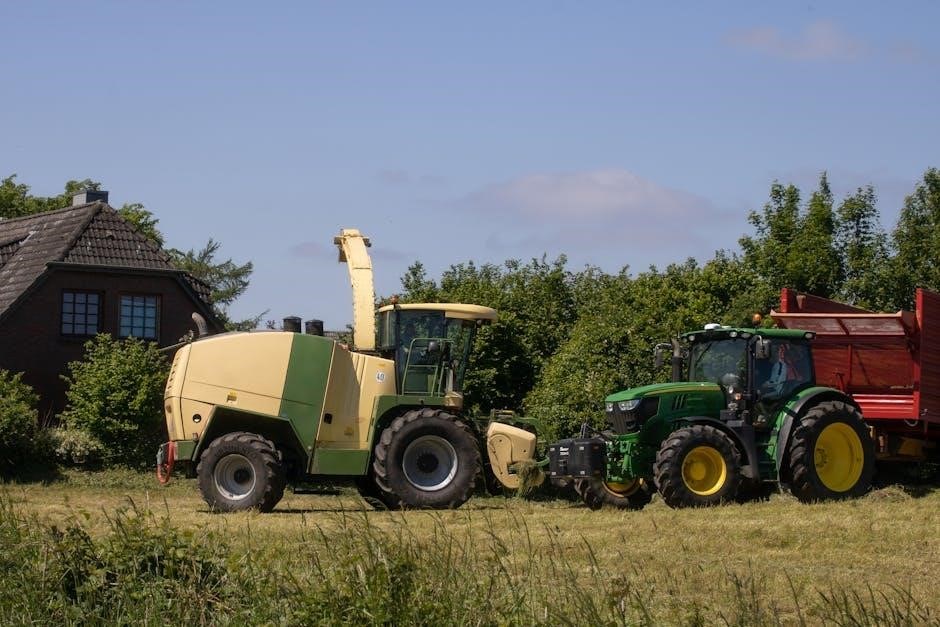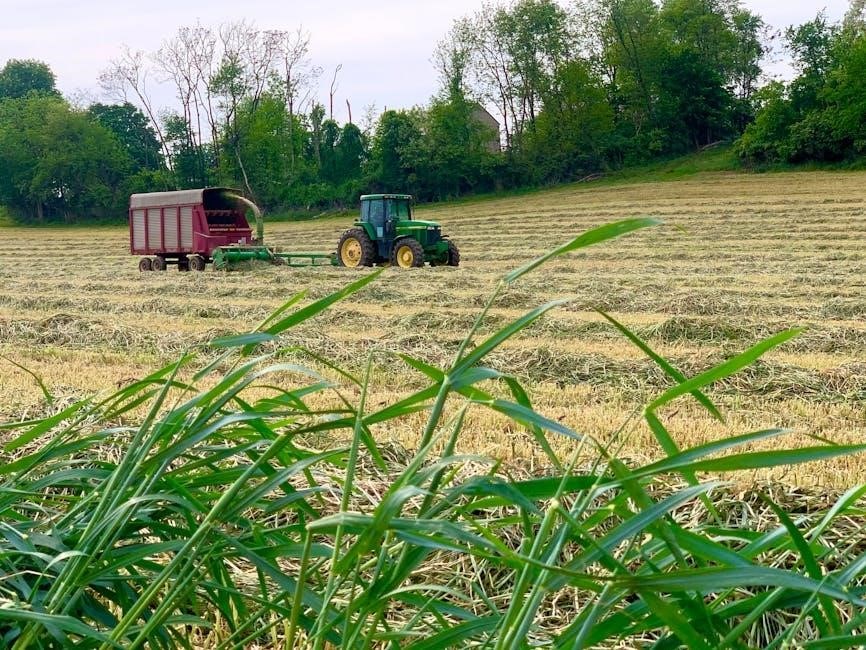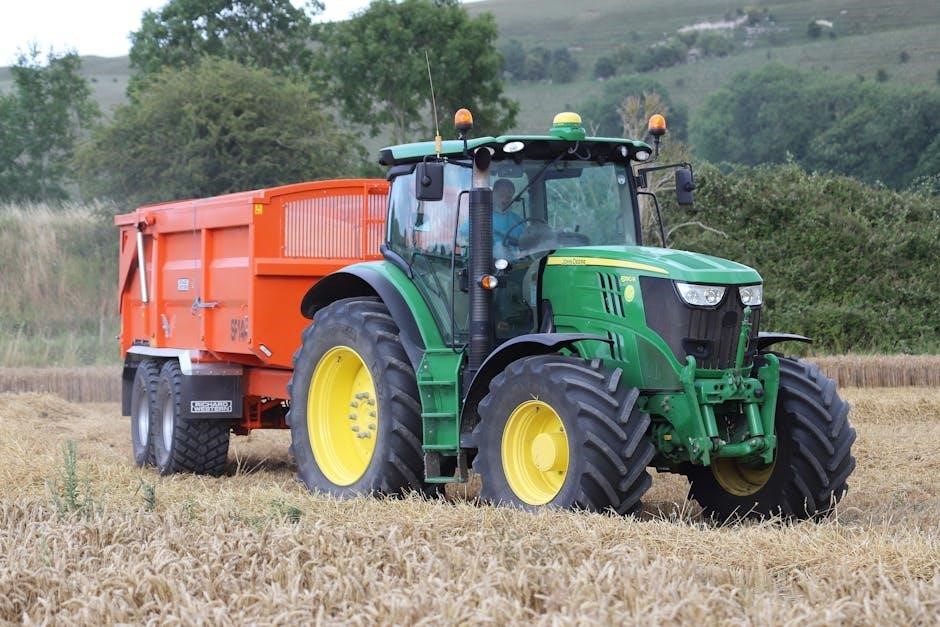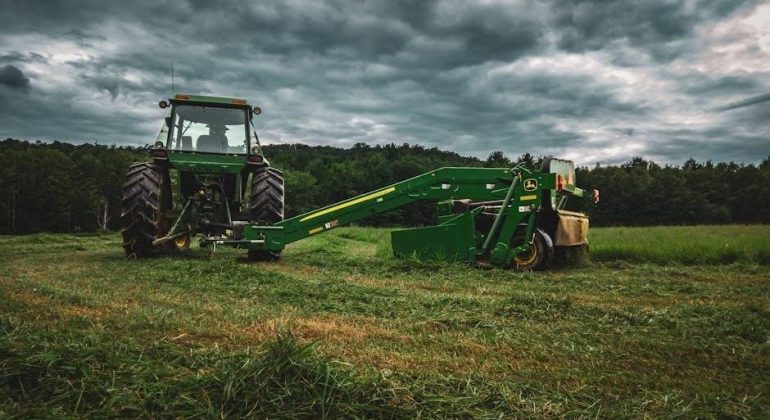Understanding the Value of John Deere Tractors
Understanding the value of John Deere tractors involves analyzing factors like model year, usage hours, and condition. A well-maintained tractor retains higher value, especially when serviced regularly, ensuring peak performance and longevity. Proper care, including regular maintenance, contributes to preserving its value over time, making it a reliable investment for agricultural needs. Additionally, market trends and seasonal demand can influence tractor pricing, so staying informed is crucial for buyers and sellers. By understanding these elements, one can make informed decisions to maximize their tractor’s value and longevity effectively.
Factors Affecting the Value of John Deere Tractors

The value of John Deere tractors is influenced by several key factors, including model year, usage hours, and overall condition. Tractors with lower hours and newer models typically retain higher value due to their longevity and performance capabilities. Maintenance history also plays a significant role, as a well-serviced tractor is more appealing to buyers. Additionally, the specific features and attachments of the tractor, such as hydraulic systems or GPS technology, can increase its worth. Market demand, seasonal trends, and regional preferences further impact pricing. Understanding these factors helps buyers and sellers assess fair market value and make informed decisions when purchasing or selling a John Deere tractor.

Importance of Model Year and Usage Hours
The model year and usage hours are critical factors in determining the value of John Deere tractors. Newer models with advanced technology generally hold higher value due to improved efficiency and durability. Tractors with fewer usage hours are often preferred by buyers, as they indicate less wear and tear. Higher hours can signal potential maintenance needs, which may reduce resale value. Additionally, tractors with recent model years typically offer better fuel efficiency and lower emissions, making them more attractive in today’s eco-conscious market. Monitoring these aspects helps in accurately assessing a tractor’s worth and ensuring a fair deal for both buyers and sellers in the marketplace.
Role of Tractor Condition in Determining Value
The condition of a John Deere tractor plays a pivotal role in determining its value. A well-maintained tractor with minimal wear and tear commands a higher price, while neglect or damage can significantly reduce its worth. Key factors include the exterior and interior condition, functionality of hydraulic systems, and the state of tires and attachments. Tractors with clean, rust-free bodies and properly functioning engines are more desirable. Additionally, any custom modifications or upgrades can enhance value, provided they are in good working order. Proper servicing and timely repairs further preserve a tractor’s condition, making it more attractive to potential buyers. Documentation of maintenance history can also bolster its value in the marketplace.

Key Steps to Determine Tractor Value
Research using official John Deere tractor value guides and compare prices of similar models. Inspect the tractor’s condition, checking for damage and maintenance records. Consider market demand, seasonal fluctuations, and certified pre-owned options. Use negotiation strategies based on fair market value, and evaluate trade-in values and warranty options to make informed decisions.
How to Research and Compare Prices
To determine the value of a John Deere tractor, start by researching official value guides and pricing tools. Check online marketplaces like TractorHouse or MachineryTrader for comparable models. Visit dealerships to inquire about pricing and trade-in options. Evaluate the tractor’s condition, including maintenance records and any repairs. Consider consulting equipment appraisers for an unbiased assessment. Additionally, analyze seasonal demand fluctuations, as prices may vary depending on the time of year. Compare prices from multiple sources to identify fair market value. This thorough research ensures informed decision-making for buyers and sellers, helping to secure the best possible deal.

Using John Deere Tractor Value Guides
John Deere tractor value guides are essential tools for determining accurate pricing. These guides provide detailed information on tractor models, including their specifications, original pricing, and depreciation rates. They also consider factors like condition, usage hours, and maintenance history. By referencing these guides, buyers and sellers can assess fair market value. Additionally, they offer comparisons with similar models, helping to identify competitive pricing. Regular updates ensure the data reflects current market trends. Using these guides enables informed decision-making, whether purchasing, selling, or trading in a tractor. They are available online or through authorized John Deere dealers, making them accessible for anyone seeking to evaluate tractor value effectively.

Market Demand and Trends
Market demand for John Deere tractors fluctuates with seasonal farming needs and economic conditions. Technological advancements and evolving agricultural practices also influence trends, affecting tractor value significantly over time.
How Market Trends Impact Tractor Value
Market trends significantly influence the value of John Deere tractors, as fluctuations in supply and demand, economic conditions, and technological advancements play a crucial role. Economic downturns can reduce demand, lowering tractor values, while a strong agricultural sector may increase prices. Seasonal variations, such as higher demand during planting or harvesting seasons, can also impact pricing. Additionally, the introduction of new tractor models with advanced features often raises the value of newer machines, while older models may depreciate faster. Regional demand differences further complicate pricing, as certain areas with robust agricultural activity may see higher tractor values. Understanding these trends is essential for buyers and sellers to make informed decisions.
Seasonal Fluctuations in Tractor Pricing
Seasonal fluctuations significantly impact John Deere tractor pricing, influenced by agricultural cycles and demand patterns. Prices tend to rise during peak farming seasons, such as planting and harvesting times, when farmers need reliable equipment. Conversely, during off-peak seasons, demand decreases, leading to lower prices. Weather conditions also play a role; favorable weather may boost demand, while adverse conditions can reduce it. Additionally, holiday periods and end-of-year sales often feature discounts or promotions, further affecting pricing. Understanding these seasonal trends allows buyers to time their purchases strategically and sellers to optimize listing times for better returns. Staying attuned to these fluctuations is key to securing the best value in the market.

Additional Tips for Buyers and Sellers
Maximizing tractor value involves thorough inspections, maintenance records, and honest communication. Buyers should prioritize condition and functionality, while sellers should present equipment in its best state.
Negotiation Strategies for Best Value
Negotiation is key to securing the best value for John Deere tractors. Buyers should research market prices and compare similar models to make informed offers. Knowing the tractor’s condition, model year, and maintenance history can strengthen bargaining positions. Sellers should highlight the tractor’s positive attributes and provide detailed maintenance records to justify pricing. Timing plays a role, as purchasing during off-peak seasons may lead to better deals. Flexibility in negotiations, such as including accessories or service packages, can also enhance value. Both parties should aim for transparency and mutual benefit, ensuring a fair and satisfactory agreement. This approach fosters trust and long-term satisfaction for all involved.
Understanding Certified Pre-Owned Tractors
Certified Pre-Owned (CPO) tractors offer a reliable option for buyers, ensuring quality and value. These tractors undergo rigorous inspections, often by authorized dealers, to meet specific standards. They typically include extended warranties and detailed maintenance records, providing peace of mind. CPO programs enhance transparency, as they require tractors to be in excellent condition with minimal wear. Buyers benefit from reduced risks and lower costs compared to new models. Sellers can leverage CPO status to attract higher prices due to the added assurance of quality. This certification bridges the gap between new and used equipment, offering a cost-effective solution while maintaining performance and longevity. It’s a smart choice for those seeking value without compromising on reliability.
Final Considerations

Final considerations involve evaluating trade-in values and warranty options to maximize investment. Proper maintenance and timely upgrades ensure long-term productivity and resale potential, securing your tractor’s value effectively.
Trade-In Values and Warranty Options
Trade-in values for John Deere tractors depend on factors like model year, condition, and maintenance history. A well-maintained tractor with low usage hours typically retains higher value. Buyers should consider warranty options, as they provide protection against unexpected repairs and enhance long-term savings. Sellers can benefit from trade-in programs offered by dealerships, which often include evaluations to determine fair market value. Certified pre-owned tractors may come with extended warranties, increasing their appeal; Understanding warranty terms and trade-in policies is essential for maximizing investment. Proper documentation and regular servicing can significantly boost trade-in values. Both buyers and sellers should research these options to make informed decisions and ensure a smooth transaction process.

Investing in a John Deere tractor is a smart choice, as it offers durability and performance. Protect your investment by prioritizing maintenance and exploring warranty options. This approach ensures your tractor remains a trusted work partner, delivering long-term value and satisfaction.
